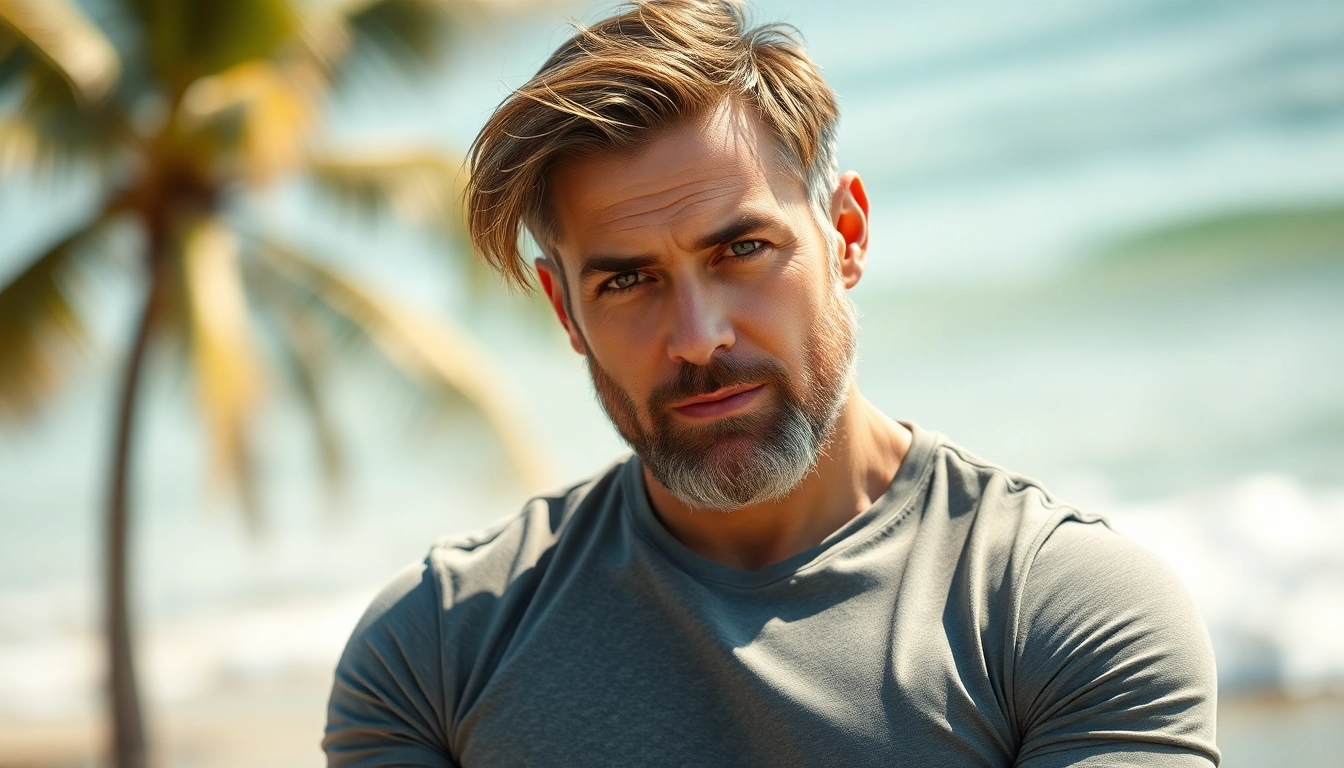Introduction to DILF: Definition and Origin
The term dilf meaning has become a prominent part of modern slang, especially within pop culture and internet communities. Originally emerging as a humorous or admiring label, DILF stands for “Dad/Daddy I’d Like to Fk.” Unlike its counterpart MILF, which emphasizes maternal attractiveness, DILF focuses on older, more mature men who exude sex appeal. The phrase’s colloquial nature allows it to be used humorously, affectionately, or as a genuine compliment, depending on context and tone.
The evolution of the term traces back to the late 20th and early 21st centuries, coinciding with the rise of internet culture and the proliferation of meme-driven language. Its roots are intertwined with popular media, particularly films and television shows that spotlight attractive older men, often in a humorous or exaggerated manner. The term gained more mainstream recognition after its association with the film “American Pie Presents: The Book of Love” (2009), where a character’s father is humorously dubbed a DILF. This film, and others like it, helped normalize the phrase and embed it into everyday conversations, especially among younger audiences.
The Cultural Evolution of DILF: From Slang to Mainstream
Initially a niche slang term among internet users and youth subcultures, DILF transitioned into mainstream vernacular thanks to viral memes, social media, and pop culture references. Its emergence can be seen as part of a broader trend where provocative or humorous labels like MILF, DILF, and their derivatives become part of everyday language, often used to compliment or tease.
This evolution was driven by a combination of factors: the rise of social media platforms like Instagram, Reddit, and TikTok, where images and videos of attractive older men are shared and celebrated; the influence of pop culture icons and characters; and a general societal shift toward more open discussions about sexuality and attraction. The term’s versatility allows it to be used in humorous contexts, such as memes or jokes, as well as in more serious admiration of someone’s maturity and attractiveness.
One pivotal moment in this cultural shift was the proliferation of internet communities dedicated to DILFs, such as r/DILFs on Reddit, which gathers almost 100,000 members sharing NSFW and SFW content. The term also gained traction through social media accounts like DILFs of Disneyland, which showcases photos of attractive fathers and older men enjoying family outings. These platforms have played a vital role in normalizing and popularizing the term, making it accessible and relatable to a wide audience.
DILF in Popular Culture: Movies, TV Shows, and Video Games
Popular culture has been instrumental in shaping and spreading the concept of the DILF. From movies and television to video games, various media have depicted characters that embody the qualities associated with DILFs—maturity, attractiveness, strength, and a protective nature.
Daddy Halsin in Baldur’s Gate
One of the most iconic recent examples is Daddy Halsin, a character from the acclaimed video game Baldur’s Gate III. Halsin is a druid and a prominent figure within the game’s storyline. Fans quickly dubbed him “Daddy Halsin” due to his commanding presence, protective nature, and mature attractiveness. His portrayal as a strong, caring, and authoritative figure resonates with the qualities that define a DILF, making him a favorite among players seeking to explore mature, appealing characters within the game.
Fred Andrews in Riverdale
On television, Fred Andrews, portrayed by Luke Perry in the hit series Riverdale, has often been described by fans as a quintessential DILF. As the father of protagonist Archie Andrews, Fred embodies the qualities associated with the term—maturity, responsibility, and physical attractiveness. His character’s portrayal as a caring but strong father figure has made him a popular example of the DILF archetype in mainstream media, further cementing the term’s place in popular culture.
Rob’s Father in American Pie Presents: The Book of Love
The 2009 film American Pie Presents: The Book of Love introduced a humorous portrayal of a DILF through Rob’s father. The film, rooted in the same comedic tone that popularized MILF, used his character to add humor and adult appeal. The portrayal of Rob’s father as an attractive older man with a confident demeanor helped normalize the concept and made it more recognizable among audiences who enjoy comedy with a sexual undertone.
The Internet and Social Media Trends: DILFs of Disneyland and Reddit Communities
The digital age has significantly contributed to the popularization and normalization of DILF culture. Social media platforms allow users to share images, videos, and memes that celebrate attractive older men, often emphasizing their maturity and charisma.
One notable example is the Instagram account DILFs of Disneyland, which boasts over 300,000 followers. This account curates photos of fathers and older men enjoying family outings at Disneyland, highlighting their attractiveness and playful personalities. Such content combines wholesome family moments with a subtle nod to the attractiveness of older men, making it both humorous and endearing.
On Reddit, the community r/DILFs has grown to nearly 100,000 members. It serves as a space where users share NSFW and SFW images, memes, and discussions centered around the appeal of DILFs. The community fosters a sense of camaraderie and appreciation for mature men who exude confidence, strength, and attractiveness. This online culture plays a vital role in shaping perceptions of what constitutes a DILF and normalizing the term across different demographics.
DILF vs. MILF: Similarities, Differences, and Usage in Modern Language
While DILF and MILF are often discussed together, they have distinct connotations and uses. MILF, which stands for “Mom/Mommy I’d Like to Fk,” initially gained popularity through pop culture, especially after the release of the movie American Pie in 1999. It typically refers to attractive older women who are also mothers, emphasizing their sensual appeal and maternal qualities.
In contrast, DILF centers on older men who may or may not be fathers but are characterized by their maturity, confidence, and attractiveness. The “Dad/Daddy” component adds a layer of authority, strength, and sometimes nurturing qualities. Both terms are often used humorously or affectionately, but DILF tends to carry a slightly different tone—more associated with mature masculinity and strength.
In modern usage, both terms have become part of internet slang, meme culture, and mainstream conversations. They are often employed to compliment or tease, sometimes with a humorous edge, but increasingly as genuine expressions of admiration. Their popularity has also led to the creation of various derivatives and related terms that explore different facets of attractiveness and maturity.
Why the Term DILF Resonates: Appeal, Humor, and Respect
The enduring popularity of the DILF term can be attributed to several factors. Firstly, it taps into societal admiration for maturity and masculinity. Older men who exude confidence, strength, and attractiveness often challenge youth-centric beauty standards, making them especially appealing to a broad audience.
Secondly, the humorous and playful nature of the term makes it accessible and easy to use in casual conversations. It adds a layer of humor and lightheartedness, often used in memes or jokes to express admiration without seriousness. This playful tone helps normalize discussions about sexuality, attractiveness, and masculinity among diverse age groups.
Lastly, the term commands respect by acknowledging that attractiveness isn’t solely reserved for youth. It celebrates the allure of maturity, experience, and confidence—traits that many find irresistible. The DILF archetype embodies a blend of strength, charisma, and tenderness, resonating deeply with audiences seeking authentic representations of masculinity.
The Role of DILF in Pornographic and Pop Culture Search Trends
In the realm of adult entertainment and online search behavior, DILF has become a highly searched tag and niche category. Pornographic websites often categorize content with tags like DILF to target viewers interested in mature, attractive men. This trend reflects societal fascination with older men who possess a youthful appeal or possess qualities typically associated with masculinity and confidence.
Moreover, popular search engine queries and social media hashtags highlight the term’s popularity. The rise of content creators, influencers, and models who embrace the DILF persona further fuels this trend. The term’s widespread usage in search data indicates a significant cultural appreciation, curiosity, and acceptance of this archetype.
Conclusion: The Significance and Future of the DILF Phenomenon
The dilf meaning has evolved from a humorous slang term to a cultural phenomenon that celebrates mature masculinity and attractiveness. Its journey through movies, television, internet communities, and social media underscores its significance as a symbol of confidence, strength, and appeal in modern culture.
As society continues to embrace diversity in beauty standards and age-related attractiveness, the DILF archetype is likely to grow in prominence. From pop culture characters like Daddy Halsin to internet memes and viral social media accounts, the term encapsulates a blend of humor, admiration, and respect that resonates with a broad audience.
Understanding the concept of DILF provides insight into evolving perceptions of masculinity, attractiveness, and sexuality. Whether used humorously or sincerely, the term’s popularity signifies a broader cultural shift towards valuing maturity and confidence in defining allure. The future of the DILF phenomenon suggests it will remain a vital part of modern slang, pop culture, and online communities, reflecting society’s appreciation for diverse expressions of masculinity and attractiveness.
In summary, the DILF archetype offers a nuanced view of attractiveness that challenges ageist stereotypes and celebrates the appeal of mature men. Its widespread acceptance and usage underscore its importance in contemporary language and culture, making it a fascinating subject for ongoing discussion and exploration in the years to come.

